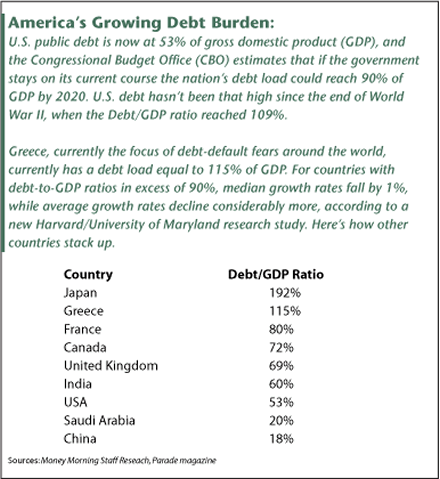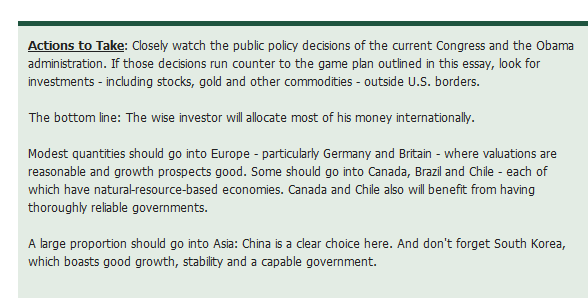How to Protect Your Wealth From U.S. Debt Economic Stagnation Japan Style
Economics / US Economy Aug 19, 2010 - 05:31 AM GMTBy: Money_Morning
 Martin Hutchinson writes:
Grim unemployment figures, growing worries about crushing debt loads and the apparent absence of any inflation are causing many investors to ask a tough question: Is the U.S. economy catching the "Japan disease," the dreaded and dreadful malaise that has left the onetime Asian powerhouse in a stagnant state since 1990?
Martin Hutchinson writes:
Grim unemployment figures, growing worries about crushing debt loads and the apparent absence of any inflation are causing many investors to ask a tough question: Is the U.S. economy catching the "Japan disease," the dreaded and dreadful malaise that has left the onetime Asian powerhouse in a stagnant state since 1990?
It's a crucial question.
And the answer will guide your investment decisions for the next 20 years.
Dire Straits - Japan Style
Although Japan has been in tough straits since that country's stock-and-real-estate bubble burst in January 1990, there are some surprising realities about this two-decade stretch.
First, and perhaps most surprising of all, as tough as its situation has been, Japan didn't actually suffer a true recession until 2008. From 1990 to 2008, the country endured what one economist referred to as "feel-bad" growth, with real gross domestic product (GDP) advancing at an anemic annual rate of 0.7%.
Second - despite what many economists claim - Japan did not experience "devastating deflation." The country's consumer price index (CPI) has increased by about 0.2% per year since 1991, when the 1980s inflation ended (it has fallen in the last five years, but only by 0.3% total).
The upshot: The "Japan disease" is not as severe as the doom-mongers would have us believe. It is certainly not a replica of the U.S. Great Depression, in which real GDP declined by 25% over a four-year period and prices fell by a third.
That's not to say that the last 20 years haven't been deeply depressing for the Japanese themselves. During the 40 years that came before the two-decade malaise - we're essentially talking about a period that stretched from 1950 to 1990 - the people of Japan watched as their standard of living increased at an astonishing rate. Then economic growth came to an almost-complete standstill, and their stock-and-real-estate investments plunged by three quarters.
The Japanese economy of the late 1980s was self-deluding in very much the same way as the U.S. stock market of 1997-2000 or the housing market of 2004-2006. But the awakening from that delusion has been both painful and extraordinarily prolonged.
Japan's policy actions during the last 20-year period do, indeed, bear a considerable resemblance to U.S. policy actions since the September 2008 financial meltdown.
Short-term interest rates were quickly slashed to near zero, and have remained below 1% for more than a decade.
Endless programs of "fiscal stimulus" were attempted, initially devoted to infrastructure programs in Japan's rural areas, but more recently including payments to Japan's poorer families. These achieved nothing useful, but drove Japan's debt burden up above 200% of GDP.
Throughout the 1990s, Japan's banks were propped up by cheap state loans, and were the beneficiaries of all kinds of programs seeking to prevent them from recognizing the growing losses on their real-estate loans and holdings.
The only time the script was changed was during the five-year premiership (2001-2006) of Japanese Prime Minister Junichiro Koizumi. Banks were forced to write their loans down to realistic levels and state spending was cut back, the budget being moved towards balance. This produced the only semblance of economic recovery in the period.
Regrettably, after Koizumi left office, his policies were first modified and then abandoned.
Current Prime Minister Naoto Kan has a real problem on his hands, and he knows it: At its current rate of progress, Japan is only about two years away from the point at which default on its debt becomes inevitable. Unfortunately, the spending forces in his own Democratic Party of Japan (DPJ) party are very powerful and he may not succeed in resisting them.
In summary, Japan's fate over the last 20 years has not been disastrous. But it has been very unpleasant, and it has blighted the careers and prospects of an entire generation of Japanese young people.
Worrisome Parallels
In the United States, the initial impetus for current downturn - the collapse of a gigantic financial bubble - is very similar to the catalyst that set the malaise in motion in Japan.
In the United Sates - as in Japan - the banks have been bailed out and cushioned from recognizing the full extent of their losses. As was also the case in Japan, interest rates in the United States have been reduced to near zero, with U.S. Federal Reserve Chairman Ben S. Bernanke carrying out very much the same monetary policy as the Bank of Japan.
Fiscally, the current U.S. "stimulus" (public-spending) policies are akin to those that were pursued in Japan, although the American versions have been much-less-carefully directed than was Japan's infrastructure stimulus of the 1990s.
With global commodity prices rising fast and the United States having cemented its future as a debtor - rather than a creditor - nation, there is some hope that a burst of inflation will arrive to spare us from the worst aspects of the Japanese disease (although that will bring troubles of its own).
 However, if current policies remain unchanged, there is still a pretty good chance that inflation won't save us. And that means that U.S. housing and U.S. stocks would likely resume a decline that leaves us with peak-to-trough losses of as much as 75%.
However, if current policies remain unchanged, there is still a pretty good chance that inflation won't save us. And that means that U.S. housing and U.S. stocks would likely resume a decline that leaves us with peak-to-trough losses of as much as 75%.
For the U.S. markets to follow that storyline to the letter, we'd have to see an additional slide of about 50% in housing and a sell-off in stocks that would take the closely followed Dow Jones Industrial Average down to about 3,500 - it closed yesterday (Wednesday) at 10,415.54.
Declines of that magnitude in two such crucial markets would, indeed, lead to two decades of economic stagnation - if not something worse.
A High-Probability Fix-It Strategy
Avoiding this outcome is simple, as it should have been in Japan.
Interest rates must increase, favoring savers over borrowers, and rebuilding the pool of U.S. savings that would be available for private-sector investment.
The U.S. budget deficit must be cut - by as much as possible. And this needs to be accomplished by slashing spending - rather than through economy-sapping tax increases.
Housing subsidies must be cut and banks must be forced to recognize their losses.
Finally, the policy of tight money and tight budgets, similar to that of Koizumi, the former Japanese prime minister (though he did not raise interest rates enough), must be carried through wholeheartedly, and not abandoned after five years as it was in Japan.
Your guess is as good as mine as to whether these policy changes will be made in time to avoid further collapses in U.S. stock prices, and to dodge additional erosions in the U.S. housing market.
To guard against them, there is one rule to remember: You may have to live in this lousy economy, but your money doesn't - so invest as much as possible of it overseas, where growth is robust and policies are sensible.

[Editor's Note: As you reflect upon today's recommendations, keep one fact in mind: Money Morning's Martin Hutchinson has been on a global hot streak.
Here's what we mean. Just a week after Hutchinson recommended Germany, the European keystone reported much stronger-than-expected GDP. He recommended Chile back in December, and three of the stocks he highlighted have posted strong, double-digit returns - and one is up nearly 25%. He again recommended Korea - which analysts were downgrading - only to have the traditionally conservative International Monetary Fund (IMF) come out with an upgraded forecast that projects solid growth for that Asian Tiger for this year and next.
A longtime international merchant banker, Hutchinson has a nose for profits instincts - as evidenced by his unerring ability to paint a picture of what's to come. He's able to show investors the big profit opportunities that are still over the horizon - while also warning us about the potentially ruinous pitfalls hidden just around the corner.
With his "Alpha Bulldog" investing strategy - the crux of his Permanent Wealth Investor advisory service - Hutchinson puts those global-investing instincts to good use. He's managed to combine dividends, gold and growth into a winning, but low-risk formula that has developed eye-popping returns for subscribers.
Take a moment to find out more about "Alpha-Bulldog" stocks and The Permanent Wealth Investor by just clicking here. You'll the time well spent.]
Source : http://moneymorning.com/2010/08/19/u.s.-economy-5/
Money Morning/The Money Map Report
©2010 Monument Street Publishing. All Rights Reserved. Protected by copyright laws of the United States and international treaties. Any reproduction, copying, or redistribution (electronic or otherwise, including on the world wide web), of content from this website, in whole or in part, is strictly prohibited without the express written permission of Monument Street Publishing. 105 West Monument Street, Baltimore MD 21201, Email: customerservice@moneymorning.com
Disclaimer: Nothing published by Money Morning should be considered personalized investment advice. Although our employees may answer your general customer service questions, they are not licensed under securities laws to address your particular investment situation. No communication by our employees to you should be deemed as personalized investent advice. We expressly forbid our writers from having a financial interest in any security recommended to our readers. All of our employees and agents must wait 24 hours after on-line publication, or 72 hours after the mailing of printed-only publication prior to following an initial recommendation. Any investments recommended by Money Morning should be made only after consulting with your investment advisor and only after reviewing the prospectus or financial statements of the company.
Money Morning Archive |
© 2005-2022 http://www.MarketOracle.co.uk - The Market Oracle is a FREE Daily Financial Markets Analysis & Forecasting online publication.



